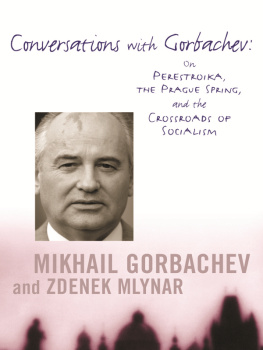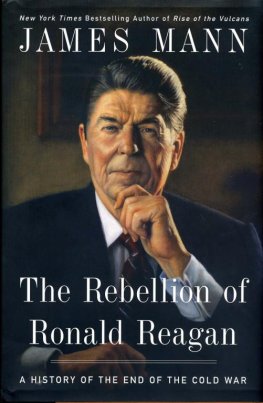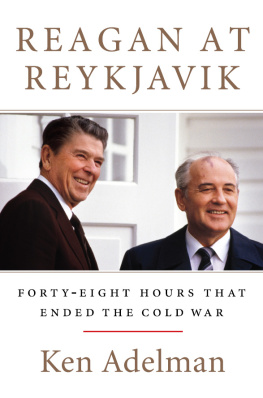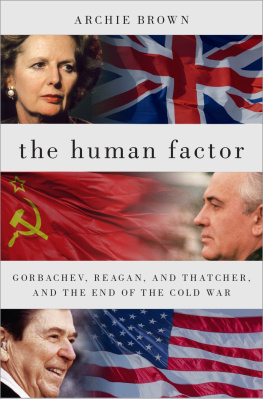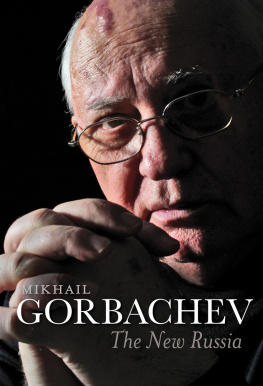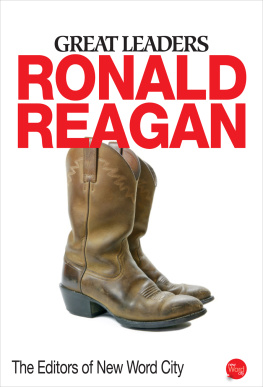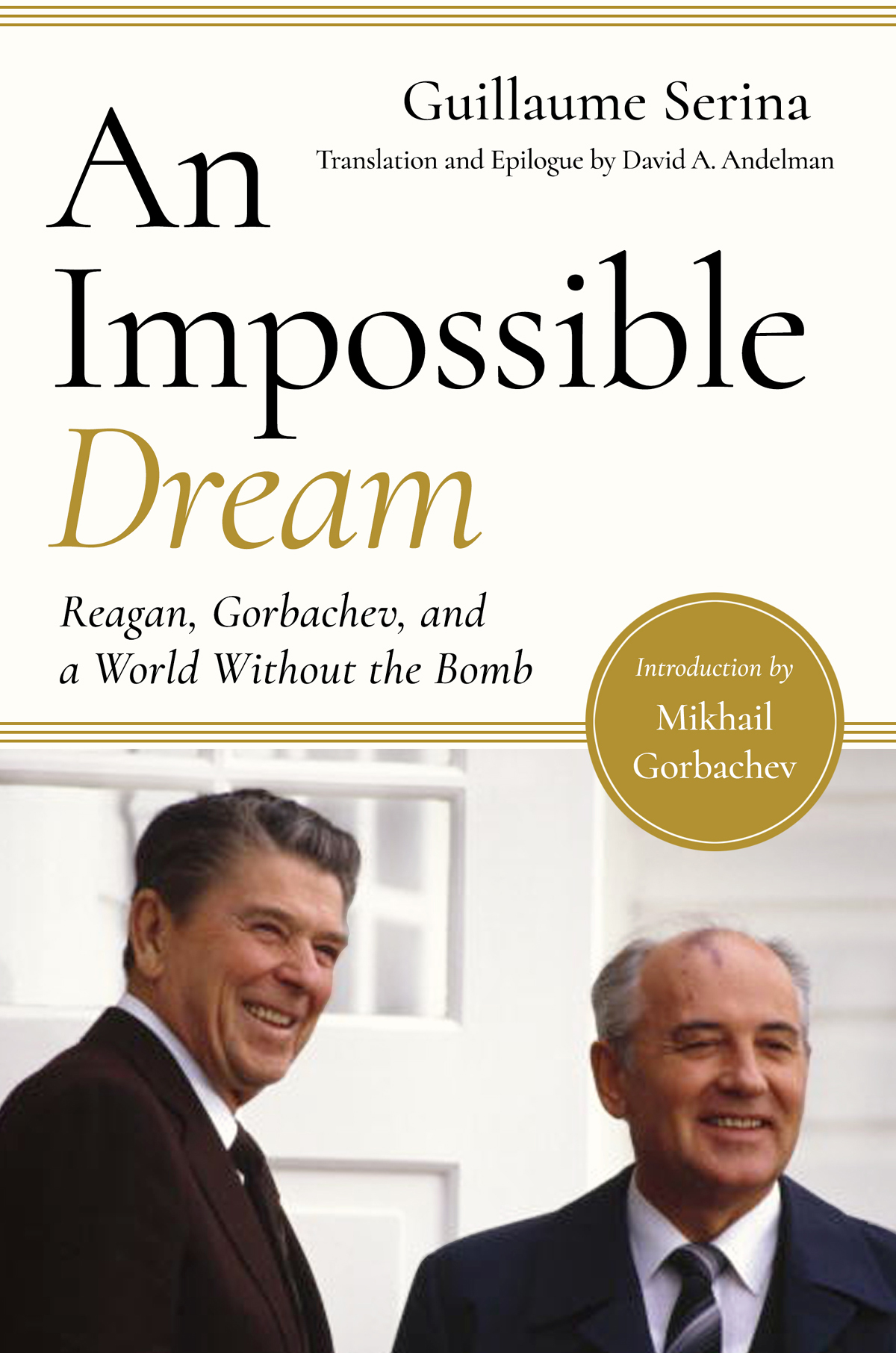Contents
Guide
Page List
An Impossible Dream
Reagan, Gorbachev, and a World Without the Bomb
Guillaume Serina
Translated from the French by David A. Andelman
Introduction by Mikhail Gorbachev
Afterword by David A. Andelman
To Benjamin and Daniel
Contents
by Mikhail Gorbachev
by David A. Andelman
by Mikhail Gorbachev

T hirty years after the Reykjavk summit, has the world learned the most fundamental lesson we sought to convey at this summit of the worlds two superpowers?
Todays relationship between Russia and America is strained. The question of trust is back at the heart or our relationship: Can we trust each other again? The international context has changed. Its become worse on many levels, with tensions and dramatic crises. On top of it all, nine countries now have nuclear weapons, four of them situated in deeply unstable regions: North Korea, Pakistan, India, Israel.
Guillaume Serinas book seeks to build a bridge between yesterday and today. The detailed account of my meetings with President Ronald Reagan in Geneva and in Reykjavk, pieced together from interviews with some of the key participants and observers, puts in perspective what we tried to accomplish in Iceland: ridding the world of all nuclear weapons. Our meeting ended without an agreement on total elimination. But I am convinced, after the passage of three decades, that we did succeed in building a new model of negotiating the nature of our most deadly nuclear arsenals. The treaties and agreements that followed drastically reduced their numbers.
I suggested to President Reagan that he meet with us in Reykjavk in 1986 because I was very worried about the worlds situation, and especially the state of relations between the two superpowers. A year earlier, we had met in Geneva. After difficult discussions, we adopted a joint statement which contained two central points. First, a nuclear war cannot be won and must never be fought. The second point, however, is equally important: the United States and the Soviet Union must not seek military superiority over the other.
My opinion from the beginning was that since the leaders of the two great powers agreed on these points, negotiations had to be conducted with the goal of moving immediately in this direction. We had to achieve, as soon as possible, radical cuts of nuclear weapons in all categories. But even after Geneva, the negotiations were not going well. Indeed, they were at a standstill.
Moreover, relations between our two countries were generally tense. They were routinely and dangerously being put to the test. In the spring of 1986, American warships entered our territorial waters in the Black Sea. We were forced to push them back. It was essential to break this negative cycle.
Our proposals were clear and concrete: cut in half the entire triad of strategic nuclear weapons; eliminate intermediate-range missiles in Europe; halt nuclear testing; agree on the demilitarization of space.
There were influential people in the Reagan administration who opposed the meeting. But the president accepted, making an important political choice. The discussions in Geneva between the two of us, which were attended by our foreign ministers, then broadened to include our experts, were concrete and productive.
We agreed on the main issues. Not only did we set a goal of a 50 percent cut in our nuclear arsenals in five years, but we agreed on the ultimate goala world without nuclear weapons. President Reagan said, I am ready for that. I was also ready to sign such an agreement in principle right there in Reykjavk.
Sadly, this did not happen. The obstacle was the Strategic Defense Initiative (SDI), a project dear to Reagan. He insisted we give a green light to weapons tests in space. I could not agree. To agree on the elimination of weapons on Earth while at the same time opening an arms race in space was not acceptable to me.
Thats how we parted. An agreement that could have been historica 50 percent reduction of the entire triad of nuclear weaponshad still not been signed. But at the press conference following our Reykjavk meeting, after thinking very seriously about the position we had reached during the negotiations, I told the hundreds of journalists who gathered there with high expectations: It is not a failure, but a breakthrough. We looked beyond the horizon, to consider a world without nuclear weapons.
Subsequent events confirmed my judgment. The momentum of Reykjavk enabled us to sign, one year later, a treaty on the elimination of short and medium-range missiles. Let me insist on one key point that is generally underestimated: the ceilings and other elements agreed upon in Reykjavk began to take effect even before the formal treaties were signed. The total number of nuclear weapons stopped rising and major reductions were achieved in the three decades that have followed.
In 1991, President George H. W. Bush and I signed the first START (Strategic Arms Reduction Treaty). We also agreed to eliminate the majority of our tactical nuclear weapons. The implementation of the Reykjavk program was under way. It was a time of great accomplishments!
The most important element was that the agreements included an effective verification system. We said that we were prepared to accept stricter verification measures, but on a mutual basis. And these measures have brought stability and confidence for decades.
At the time we also set a pace of reduction that, if it had continued, could have led us far beyond where we are today toward a world free of nuclear weapons. Of course, we have had great successes. The Cold War was relegated to the past. The danger of a global nuclear conflict is no longer imminent. Thousands of nuclear weapons have been destroyed.
But a lot of very troubling elements remain. Nuclear arsenals are still very large and dangerous. Hundreds of nuclear weapons continue to be deployed in Europe. The treaty to end nuclear tests is not being enforced. New nations possessing the bomb have emerged, and there is a continuing threat of nuclear proliferation. New arms races have been launched before our eyes, and the threat of the militarization of space has returned to haunt us. The promise not to seek military superiority has been forgotten. One nation alonethe United Statesaccounts for almost half of the worlds military spending.
If the situation continues, the goal of a world free of nuclear weapons will not be attainable. And one day, this weapon will explode.
What can we do to prevent this? We must demilitarizedemilitarize international relations, demilitarize political thinking. We need real progress that will prove to the world that the nuclear powers are complying with Article V of the Treaty on the Non-Proliferation of Nuclear Weapons: eliminating nuclear weapons. Nations military budgets should be cut to a level only necessary to defend themselves. All countries should give up trying to gain military superiority. Thats how I see things.
Some will say its not realistic, its utopian. But I must say that thirty years ago, many thought it was impossible to stop superpower confrontations, stop the arms race, and begin to eliminate entire stocks of weapons of war. Yet the leaders of two nuclear powers had the political will to act and the process began, despite all obstacles. What we need today is precisely this: political will. We need another level of leadership, collective leadership, of course. I want to be remembered as an optimist. Let us assimilate the lessons of the twentieth century in order to rid the world of this legacy in the twenty-firstthe legacy of militarism, violence against peoples and nature, and weapons of mass destruction of all types.


